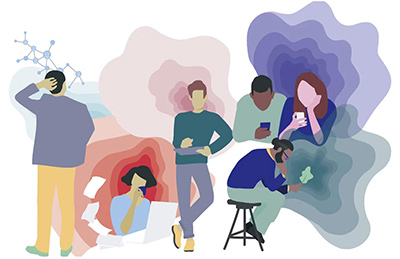In India, mental health disorders pose a significant burden, but access to mental health services is limited. The National Mental Health Survey (2015-16) indicates that around 150 million people in India require mental health interventions, which accounts for approximately 10.6% of the total population. Unfortunately, the treatment gap for mental health in India is significant, with only 10-12% of those who need care receiving appropriate treatment. Common mental health disorders in India include…
-
- Depression
- Anxiety
- Bipolar disorder
- Schizophrenia
- Substance abuse


Depression affects approximately 4.5-5% of the population, anxiety disorders impact around 3.6% of the population, and substance use disorders are prevalent, with about 14.6 million people in India suffering from alcohol use disorder and 2.8 million affected by drug abuse. However, the stigma and lack of awareness about mental health prevent people from seeking help. The country also faces a severe shortage of mental health professionals, with only one psychiatrist for every 344,000 people, much lower than the WHO-recommended ratio of one psychiatrist per 10,000 people. While the Indian government has launched initiatives like the National Mental Health Program (NMHP) and the Mental Healthcare Act, 2017, challenges persist in addressing the treatment gap and reducing mental health stigma.
Among Indian youth aged 18-25 years, depression is a significant mental health problem. According to a study published in the Indian Journal of Psychiatry, depression’s prevalence in this age group is around 9.95%. Female youth have a higher prevalence of depression (15.9%) than male youth (7.5%). Depression often co-occurs with other mental health disorders like anxiety disorders and substance use disorders. Academic pressure is a significant risk factor for depression among youth in India, and excessive social media use is also associated with depressive symptoms among Indian youth. Depression in youth is a public health concern, leading to significant functional impairment and even suicide. In 2019, the National Crime Records Bureau recorded 9,474 suicides among Indian youth aged 18-25 years, and depression was one of the leading causes of suicide.
Research Publications:
- Triploid Genetic Algorithms
- Bhasin, H, Agrawal, RK. Triploid genetic algorithm for convolutional neural network–based diagnosis of mild cognitive impairment. Alzheimer’s Dement. 2022; 18: 2283–2291. https://doi.org/10.1002/alz.12565
- Mild Cognitive Impairments
- Bhasin, H., Agrawal, R.K. & For Alzheimer’s Disease Neuroimaging Initiative. A combination of 3-D discrete wavelet transform and 3-D local binary pattern for classification of mild cognitive impairment. BMC Med Inform Decis Mak 20, 37 (2020). https://doi.org/10.1186/s12911-020-1055-x
- Diploid Genetic Algorithms
- Bhasin, H., Behal, G., Aggarwal, N. et al. On the applicability of diploid genetic algorithms in dynamic environments. Soft Comput 20, 3403–3410 (2016). https://doi.org/10.1007/s00500-015-1803-5
- Multiple Activation Parallel Neural Networks
- H. Bhasin and R. K. Agrawal, “Multiple-Activation Parallel Convolution Network in Combination with t-SNE for the Classification of Mild Cognitive Impairment,” 2021 IEEE 21st International Conference on Bioinformatics and Bioengineering (BIBE), Kragujevac, Serbia, 2021, pp. 1-7, doi: 10.1109/BIBE52308.2021.9635485.



